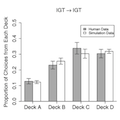Abstract
It is a hallmark of a good model to make accurate a priori predictions to new conditions (Busemeyer & Wang, 2000). This study compared 8 decision learning models with respect to their generalizability. Participants performed 2 tasks (the Iowa Gambling Task and the Soochow Gambling Task), and each model made a priori predictions by estimating the parameters for each participant from 1 task and using those same parameters to predict on the other task. Three methods were used to evaluate the models at the individual level of analysis. The first method used a post hoc fit criterion, the second method used a generalization criterion for short-term predictions, and the third method again used a generalization criterion for long-term predictions. The results suggest that the models with the prospect utility function can make generalizable predictions to new conditions, and different learning models are needed for making short- versus long-term predictions on simple gambling tasks.
